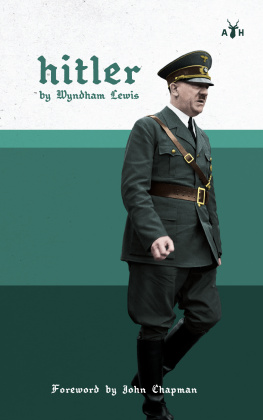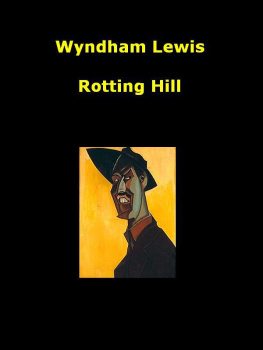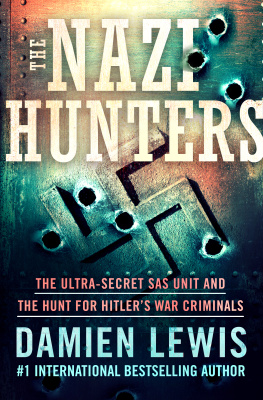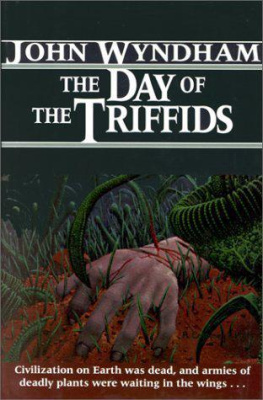H I T L E R
H I T L E R
Wyndham Lewis
Foreword by
John Chapman

Antelope Hill Publishing
Hitler
By Wyndham Lewis
Originally published 1931, University of California
This edition published 2020 by Antelope Hill Publishing
First printing 2020
Printed in the United States of America
The content of this work is in the public domain.
The foreword is the intellectual property of its author.
Cover art by sswifty.
Cover photograph, Hitler visits Finland 1942, is in the public domain, sourced from Wikipedia commons.
The publisher can be contacted at
Antelopehillpublishing.com
ISBN-13: 978-1-953730-20-6
Es ist, kein ausweg: wenn ihr versinkt, so versinkt die Menschheit mit, ohne Hoffnung einer einstigen Wiederherstellung.
There is no way out: if you sink, your humanity sinks with you, without any hope of restoration to your former glory.
(From Fichtes Addresses to the German Nation)
C O N T E N T S
PART I
BERLIN
PART II
ADOLF HITLERTHE MAN AND THE PARTY
PART III
'RACE' AND 'CLASS'
PART IV
PART V
ALL THAT IS NOT RACE IN THIS WORLD IS DROSS'
PART VI
HITLERIST ECONOMICS
PART VII
F O R E W O R D
Lewis and Hitler, Parallel Lives
By: John Chapman
Adolf Hitler, to quote Gustave Aimard, is the idea whose time has come and hour struck. If one were to paraphrase a more famous Frenchman, that of Voltaire, one might say if Adolf Hitler did not exist, it would be necessary to invent him. So ubiquitous and fascinating Adolf Hitler has been that even when reduced to a one-dimensional caricature that makes the Devil look sheepish, science fiction writers of time travel stories find it necessary to spare him in their own works as Hitler is the Atlas carrying the postmodern world, its technological development, and its morality on his shoulders. Students within community college philosophy 101 classes might brag about having the bravery of killing baby Hitler, but theres no doubt they would blink at the prospect of losing the one man that defines their entire existence.
Time Magazine has earned eternal enmity for once naming Adolf Hitler their Man of the Year. Their only error was in not naming him the Man of the Century (the winner was Albert Einstein, with runners-up being Gandhi and Franklin Delano Roosevelt). Under their own rules for Man of the Year, it was meant to signify who was the most consequential person in that year, independent of morality. They rarely ever get it right, but they got it right there, even if they couched it in descriptions later discarded by the magazines detractors that described Hitler as the greatest threatening force that the democratic, freedom-loving world faces today. There is no argument to be had. Hitler was the most consequential person of the 20th century and if the zeitgeist is anything to go by then he should already be on the 21st centurys shortlist despite being dead 75 years.
Hitler is not a man who invites indifference. The only way to have no opinion is to have no opinions. For those who shape society and sentiment however, moral disgust suffices in place of thought. What cannot be deniednot by traumatized Jews, not by agitated liberals, and not even by milquetoast critics of the rightis that the mystique of Hitler is something both ethereal and extraordinary. Savitri Devi, the forerunner of the spiritual view of Hitler that has been codified as Esoteric Hitlerism, wrote of Hitler as the Man Against Time in The Lightning and the Sun. Hitler as avatar of the Hindu God Vishnu is something that will not truck with anyone other than the over-literate handful who get lost somewhere between the weeds of irony and the forests of sincerity, but it is impossible not to be drawn into this concept of Hitler as the Man Against Time.
According to Devis work, Men In Time are the Lightning, the destructive energies of civilizational conflict that keep the world in cyclical decay. Men Above Time are the Sun, the creative and life-affirming qualities that elevate civilization above decay and create the renewal that can usher in golden ages. The Men Against Time, however, are the Lightning and the Sun, combining both of these qualities in order to create a new order and golden age of the Sun through the destructive and leveling qualities of the Lightning. To give birth to life you must also sweep away the dead.
Devi writes in The Lightning and the Sun:
And in an epoch such as that in which we are now livingwhen, all over the world, every possible attempt is made to present him not merely as a war monger but as the war criminal number one,it is not superfluous to stress the fact that Adolf Hitler was, not only at the dawn of his awakening as a Man against Time but all his life, a bitter enemy of war as such; the fact that he was by nature gifted with deep sensitiveness, and full of sympathy for others; that his programme was essentially a constructive one, his struggle, the struggle for an exalted, positive aim, his aim: the regeneration of higher mankind (of the only section of mankind worth saving) and, ultimately, through the survival of regenerated higher mankind, the restoration of the long-destroyed harmony between the cosmic Order and the sociopolitical conditions on earth, i.e., the restoration of Golden Age conditions; the opening not merely of a new era for Germany, but of a new Time-cycle for the whole world.
Many will quibble with Devis effusive views of Hitler. Many will balk at this oracular perspective. None can deny however that Hitler has a particular quality to him that defies description and so anyone willing to broach this forbidden subject soon discovers that Hitler becomes not just a mirror to the person who approaches his subject, but a magnifier of everything that pours out of them. That same effusive view of Hitler as a bitter enemy of war or as a Man of Peace would get another writer in trouble: Wyndham Lewis in his 1931 treatise Hitler.
This is the quality that Wyndham Lewis wished to capture in his analysis of Hitler. He knew there was something there, but he also knew how unhappy his English audience would be at his attempt to uncover the mystery of the Hitlerites without screaming demons at every explanation of their growing movement. The English language is replete with thought-terminating clichs like it is what it is, signifying that things may just happen for no reason and have no explanation. But of course an entire country could fall under the hypnotic spell of the man with the magical mustache who could lie bald-faced to them, lie big, and make them do things that are simply against their better nature! It just happens! Lewis understood this sentiment was bunk and wanted to understand what was really going on, no matter how offended his audience would be at the National Socialist views on everything, but especially economics and Jews.
Wyndham Lewis is not a figure youll hear about much except from people who really like Wyndham Lewis. He was both a painter and a writer, though he is probably more known these days for his writings than his paintings. Lewis was in many ways the embodiment of the pan-Anglo experience of the expansive and fungible global empire. Born to an English mother and an American father off the coast of Canada in 1882, in some respects his life superficially paralleled his future subject Adolf Hitler and made him an effective counterpart. Both men had difficult family lives with disappointed fathers; Hitlers beat him while Lewis wrote to his estranged wife: Am greatly disappointed with the boy and have unpleasant misgivings about his future. Both men lived in the gray zones of what their nations were, with Lewis pan-Anglo identity and Hitlers experience of being an Austrian with a German Bavarian dialect putting him in a world without inner Teutonic borders. Both men served heroically in the Great War and both men were artists constantly on the outs of society. Both men inevitably were drawn to fascism with a small f but sought to find their own way. Lewis however is rarely connected with Adolf Hitler except in his explicit work he wrote on him, a shame that would dog him for the rest of his life and would be frequently ignored by his admirers who want to admire him on his own terms. But writing
Next page







